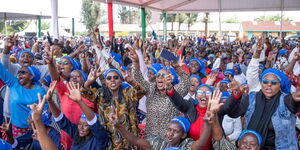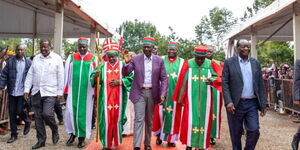Supreme Court Judge Smokin Wanjala has raised pertinent questions to the defence team representing the Independent Electoral and Boundaries Commission (IEBC) and its chairperson Wafula Chebukati, in a bit to resolve the stalemate before the apex court.
Wanjala, in a question directed to Senior Counsel Kamau Karori sought to understand the role of the commissioners in the tallying and verification process after dissenting commissioners complained that they were allocated other duties.
Karori presented that the roles and functions of the commissioners include oversight as stipulated in Article 250 of the Constitution which provides guidelines on the establishment and operations of the Commission.
However, Wanjala challenged Karori to explain how the commissioners played the oversight role which was overshadowed by the other duties.
“You did really argue very strongly that when it comes to the verification of results it is strictly within the purview of the chair. According to the enabling statute that establishes this, one of the roles of the commissioners is to oversight," Justice Wanjala stated.
"I would have thought one of the most important roles in the commissioners’ lives would be when they are overseeing the verification and tallying the presidential election result at the centre on behalf and for the people of Kenya by the chair. So what is the oversight?" He posed this question to Karori.
Justice Wanjala also sought more clarity from IEBC's lawyer Mahat Somane who made submissions on the servers and numbers used to arrive at the final tally. According to the judge, Somane’s submissions were rather contradictory on the question of whether anyone accessed the commission’s servers.
The lawyer had argued that a Venezuelan national had accessed the servers as part of the maintenance service detailed in the contract between IEBC and Smartmatic International- the firm contracted to offer information technology solutions to the electoral commission.
Justice Wanjala has since solicited a further and detailed explanation of what exactly maintenance entails.
“You did concede that this Venezuelan had access to the server as part of the maintenance. What is this maintenance, you need to tell us what maintenance entails,” enquired Wanjala.
Smokin’s Hilarious Question
The experienced judge also cracked the court into laughter when he referred to a Biblical analogy raised by Ruto's lawyer Kioko Kilukumi in his submissions.
Kilukumi had likened Raila's plea to have the court nullify the election to the story where a jealous woman pleaded with King Solomon to split a child into two after a disagreement ensued over the actual owner of the baby.
However, according to the story, the real baby's mother begged the judge not to harm the baby and instead give it to the jealous woman.
In reference to this adage, Justice Wanjala asked Kilikumi whether he was ready to seemingly advise his client (Ruto) to relinquish the election, a question which sparked a hilarious moment in the courtroom.
"You cited King Solomon and this court treats holy scriptures very seriously. I also remember that one of the mothers who according to Solomonic Wisdom could not have been the mother is the one who was saying 'cut the baby' but the other one said 'no, let her take the baby'. Would you be willing to advise...," Wanja stated before his speech was interrupted by prolonged laughter.
The counsels representing the commission and those acting for Ruto will be given 15 minutes to respond to the questions on Friday, September 2, morning.
Afterwards, the petitioner will have an opportunity to present their rebuttals as well as respond to the questions raised by the judges on Wednesday, August 31. The court is finally expected to retreat in preparation for the final verdict in line with the stipulated timelines.












